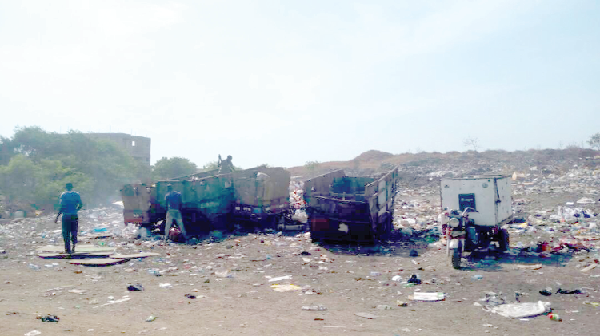
Teshie residents accuse Zoompak of dumping refuse but CEO denies
Residents of Teshie Fertiliser in the Ledzokuku Krowor municipality are up in arms against Zoompak Ghana Limited, a waste transfer station, for allowing its immediate surroundings to be used as a refuse disposal site, a situation which is causing environmental pollution and affecting their health.
The stench emanating from the refuse site finds its way into people’s homes, which has got the residents to ask why Zoompak, a subsidiary of the Jospong Group of Companies, inaugurated in 2015 as a specialised waste disposal transit service provider in Ghana, was undermining the purpose for which it was constructed.
Angry residents
The company, which is to offer tailor-made services in the area of the transportation of domestic, industrial and hazardous waste, is said to be overwhelmed by the quantum of waste generated by the residents, hence its inability to prevent residents from dumping waste around the facility, especially at night.
Some of the angry residents have served notice of their intention to demonstrate against the company and the municipal assembly for allowing the immediate surroundings of Zoompak to be used as a refuse disposal site.
When the Daily Graphic visited the area to appreciate the concerns of the residents, it saw trucks loaded with refuse heading towards Zoompak to discharge their cargo.
Some of the residents alleged that the company and the municipal assembly were profiting from that illegality, for which reason the two entities were reluctant to stop the practice.
Health concerns
Some of the concerned residents further complained about the effect of the pollution on their health, while others claimed they had developed health problems because of the strong stench that they were always inhaling into their system.
Zoompak can manage up to 1,300 tonnes of waste on a daily basis and is also expected to ease the pressure on landfill sites and improve waste service delivery in the Greater Accra Region to reduce the overall cost of operation of waste contractors in the region.
Responding to the concerns of the residents, the Chief Executive Officer (CEO) of Zoompak, Mr Yuksel Unal, blamed the Ledzokuku Krowor Municipal Assembly (LEKMA) for failing to enforce its sanitation byelaws to prevent the dumping of refuse in the area.
Denial
While denying the complicity of Zoompak in the dumping of refuse, Mr Unal told the Daily Graphic that most of the dumping was done in the night and there was no way the company could monitor and stop people from discharging refuse at the place.
He deplored the insanitary conditions in the municipality and said the assembly was not doing enough to educate the people as to where to dispose of their garbage.
According to him, he had met with the Chief Executive of the Accra Metropolitan Assembly to discuss issues bordering on the transfer station but nothing had happened.
“In fact, I am helpless on this particular occasion. If I were the Chief Executive of the Jospong Group, I would close down this transfer station because people still do not understand the concept of the station,” he told the Daily Graphic.
Waste management
Zoompak is intended to serve as the critical consolidation link to effective and efficient waste management in the region and has the capacity to transfer about 1,350 tonnes of waste per day.
It has waste management programmes such as segregation of waste, proper waste disposal, transport and waste storage and implementation of contingency plans.
The Turkish government provided technological and logistical support for the construction of the Zoompak project, but access to landfill sites is still a major problem confronting waste collectors within the region, which produces about 3,000 tonnes of waste every day.
Commenting on the issue, the Environmental Health Officer at LEKMA, Mrs Paulina Kukah, told the Daily Graphic that the only way the President’s vision of making Accra one of the cleanest cities in Africa would become a reality was to resource the environmental units of the metropolitan, municipal and district assemblies to deliver.
